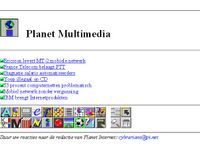The existing ISPs NLnet, XS4ALL, Knoware and Euronet were like slip roads to a highway. As a driver you could reach the highway, but you did not know where to go. A completely new approach came from KPN, be it that it was thought up by a student. Michiel Frackers, a student who just finished his study communication science, developed a plan for a consumer service or an online service together with some co-students. Basic to the consumer service was the combination of content, access and marketing. The new service, Planet Internet, offered the consumer not only the slip road to the highway, but also roadmaps; daily a number of news items and links were presented. That work was done by the so-called cybrarians, a term used by Michel Bauwens, an information manager of BP Antwerp, in 1993.
Planet Internet was set up by Quote, a publishing company, De Telegraaf, a newspaper company and telco KPN. KPN took care of nationwide dial-in network. And this was no luxery. When DDS was successful in 1994 it was crippled by a lack of telephone lines, while users had to pay long-distance tariffs outside Amsterdam. In order to solve this problem a regional dial-in network was proposed, but Planet Internet wanted an even more close-knit network. The influence of Quote and De Telegraaf was noticeable with the introduction of a starter pack, free for the first month.

A starter pack of Planet Internet in 1995 (Source: Op zoek naar de heilige graal by Michie Frackers)
The service was launched on Tuesday June 20, 1995. A subscription was 26,95 Dutch guilders (11 euro), inclusive of six hours use of the network; every extra hour would cost 4,95 Dutch guiders (3 euro). By October 1995, when finally national coverage was reached, Planet Internet totalled 14.000 subscribers and was the largest ISP. Planet was in fact the catalyst of Internet in the Netherlands.

The logo of the Daily Planet
The service was praised for its content and the new ways of journalism. Francisco van Jole was one of the first Internet journalists. He wrote the first Daily Planet on June 19, 1995 and produced 8.65 editions and left in 1998. And Peter Olsthoorn took and still takes care of Planet Multimedia.

Screenshot of Planet Multimedia
On January 1, 1997 Planet Internet merged with KPN Videotex Nederland and its Internet division World Access. The merger Planet Internet/World Access had been forced by KPN; Quote and De Telegraaf withdrew as shareholders. The merger was overseen by Riens Meijer. Incompetent managers succeeded one after the other. The consolidation period had started and the founding fathers, among them Michiel Frackers, understood the signs on the time and left. By 1999 with a subscribers total of 3000.000, the name was shortened to Planet Internet; in 2002 the service had 665.000 paying subscribers.
Planet Internet became ambitious as it wanted to set up services abroad and services for third parties. But these ventures were not successful. Planet Internet services in Great Britain, Germany and Belgium were sold within three years from the start. Services like Planet Money between ABN-AMRO and KPN and Planet Travel did not function longer than a year. But Planet Internet stayed at the top of the Dutch ISP list up to today.


On the left the cover of an essay on succes and failure factors under the title Op zoek naar de heilige graal (1993) written by the student Michiel Frackers (together with Frans Straver). On the right the cover of the book by Michiel Frackers under the same title (2001). It is says on the cover text: the true story about genious nerds, slick sales men and smart investors. Worthwhile reading. (collection Jak Boumans)

No comments:
Post a Comment